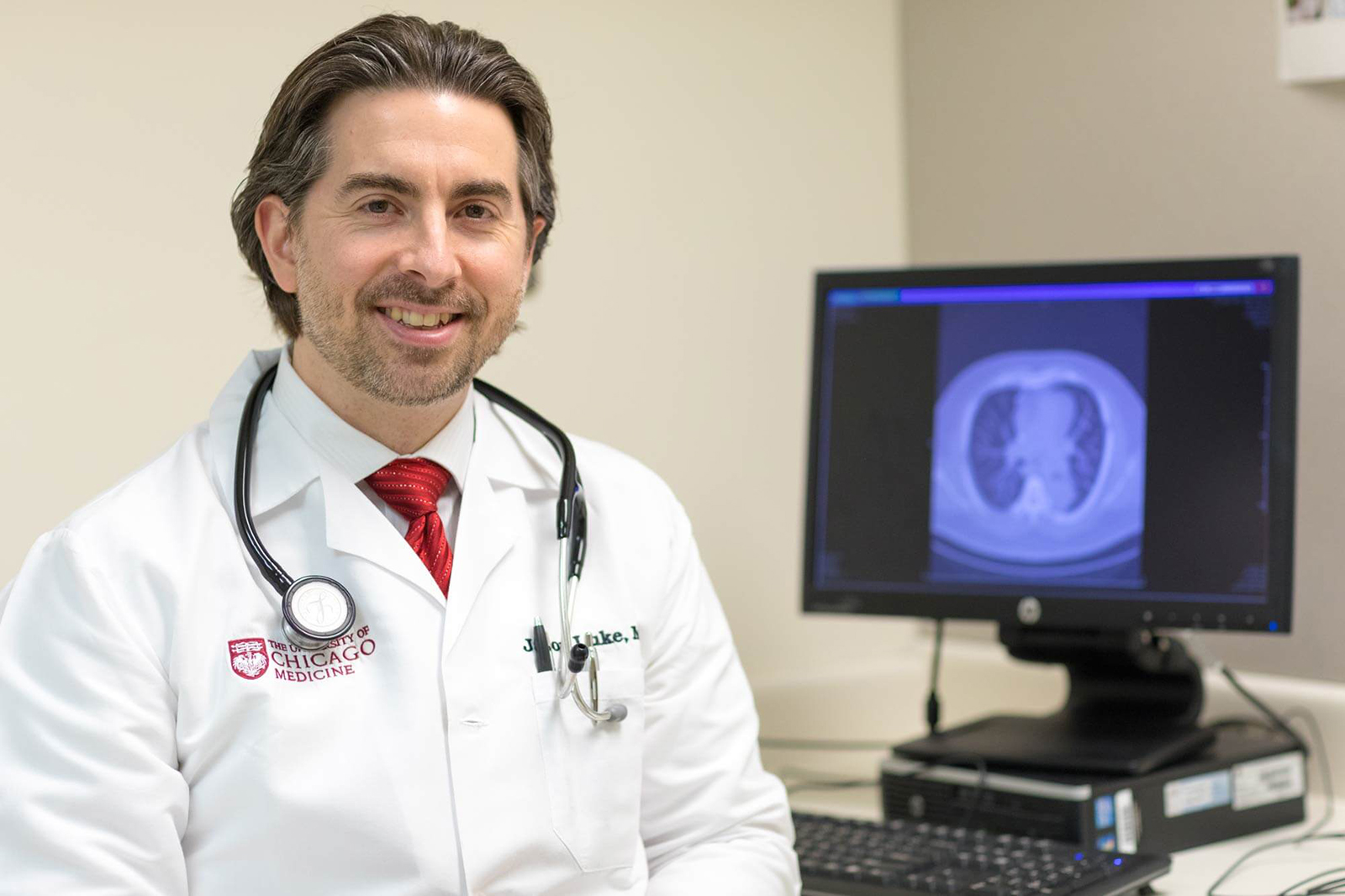Immunotherapy’s “Man of the Moment,” Dr. Jason Luke, is very hard to find. His station, buried deep within the warren of the University of Chicago’s Medical Facility in Hyde Park, is neither glamorous nor pretentious. Think dimly lit hallways and lavatories that still smell like the gravely pink borax hand soap from the 1970s—fitting, since that’s likely when the place was last renovated.
However, after peering a bit closer, you’ll discover these are genuinely hallowed halls, harboring some of the best minds in the field of cancer. Much like the understated nature of the building, Luke is humble about his many accreditations. He received his medical degree from the Rosalind Franklin University of Medicine and Science before completing fellowships at Weill Cornell Medical College and Memorial Sloan Kettering Cancer Center. Before arriving at the University of Chicago, Luke was an instructor in medicine at the Dana-Farber Cancer Institute and Harvard Medical School.
Despite his illustrious past, Luke is a man who does not like to waste time, for he is booked solid in the present. His time is spent captaining dozens of clinical trials for the university, teaching classes, and writing about new studies. The present and parabolically growing future of immunotherapy is what most concerns him.
In 2004, Luke discovered his path and has voraciously pursued it ever since. As a graduate student at Sloan Kettering studying molecular biology, he became almost single-mindedly focused on figuring out how cancer works by investigating the behavior of “cancer as a mechanism.”
Much of the power and perversion of cancer lies in its ability to turn its victims own defense systems against them, effectively causing one’s own body to attack itself. Figuring out how to progressively combat a constantly evolving mechanism is a tall order. Luke became convinced immunotherapy was critical to re-educating the immune system to fight cancer.
I think it is backward to think of immunotherapy attacking or destroying cancer. In fact, it is the reverse.
Immunotherapy, also known as biologic therapy, restores or improves the body’s immune system through the use of naturally derived or laboratory-derived substances. By boosting the immune system, the body can more effectively combat the presence and growth of cancer.
“I think it is backward to think of immunotherapy attacking or destroying cancer. In fact, it is the reverse,” Luke says. “Immunotherapy is not about going after cancer; it is about treating the immune system so it can go after cancer.”
Immunotherapy is now a standard front-line defense to fight some forms of cancer including melanoma, Non-Hodgkin lymphoma, and non-small cell cancer of the lung, bladder, kidney, head, and neck. But Luke thinks immunotherapy will eventually be used (along with other standard practices) to fight almost all types of cancer. In fact, thousands of studies and clinical trials (some of which Luke is involved in) are underway for most types of cancer. “Within five years, everyone will provide these drugs,” he says.
That a man of such character, education, and inspiration leads the charge in immunotherapy development is comforting.
It is a misconception that immunotherapy treatments have fewer side effects than other therapies—the side effects are just different. In February of this year, the National Comprehensive Cancer Network and the American Society of Clinical Oncology released guidelines for doctors to help patients manage the side effects of cancer-immunotherapy treatments, which are often under-recognized or diagnosed too late. According to Everyday Health, fewer than 5 percent of patients face serious side effects, while mild side effects like fatigue occur in 30 to 50 percent of patients. These effects can include fatigue, skin rashes, alterations to the endocrine system, gastrointestinal problems like colitis, lung inflammation/pneumonia, nephritis, hepatitis, pancreatitis, uveitis, and myocarditis. Side effects often must be managed by other medications such as corticosteroids and antihistamines. The introduction of drugs to control side effects like steroids may cause other issues. However, as Luke points out, “In the hands of experienced practitioners, immunotherapy can be a lot safer than standard and with a lower percentage of side effects than chemotherapy.”
Although specific immunotherapy treatments are standard when treating certain cancer types and covered by most insurance plans, this is not true for all treatment drugs and all cancer types. Without approval from the Food and Drug Administration, the drugs can only be used either in the context of clinical trials or off-market. According to a 2017 report from Reuters, although the amount of cancer drugs has increased by 63 percent between 2005 and 2015, the price for some newer immunotherapy drugs can top up to $250,000 per year. In the case of certain types of cancer such as mesothelioma, where there is both a known cause (asbestos exposure) and companies liable for failure to warn their employees about the risks, compensation rewards can offset some of these high costs.
And while a fantastic number of clinical trials on immunotherapy drugs are currently underway for almost all types of cancer, and researchers are almost always looking for trial subjects, getting into one of these top research hospitals takes an incredible amount of sacrifice and perseverance, as does actual inclusion in a trial. Let’s face it: Most of us do not live near one of these institutions, and even if we do, there is no guarantee the institution has a specialist or clinical trial in any particular cancer type.
But the tides are quickly turning, and in the two years since we first interviewed Luke and later followed up this past spring, immunotherapy has entered the mainstream. Stand Up to Cancer, a charitable organization that is part of the Entertainment Industry Foundation, recently began running primetime commercials featuring“NYPD Blue” and “How to Get Away with Murder” actor Jimmy Smits touting the benefits of immunotherapy.
Even if immunotherapy is not accessible to every cancer patient, medical institutions are working tirelessly to make the demand meet its accessibility.
If you were to ask which would you rather take—immunotherapy or chemotherapy—nine times out of 10, or even 9.9 times out of 10, people would pick the immunotherapy because it’s much less toxic.
The world of immunotherapy is moving fast and has broad appeal for combating many types of cancer. In recent years, a massive paradigm shift seems to be occurring away from standard chemotherapy and radiation regimens and towards immunotherapy. “Immunotherapy is far and away the biggest thing going on,” Luke says.
This shift is exciting for many reasons, the first being it illuminates the proven efficacy of this new treatment option. “There is such a difference that if it works,” Luke begins, “Immunotherapy can generate long-lasting benefits, meaning years as opposed to chemotherapy, which is months.” Getting to the bottom line of immunotherapy is difficult indeed, but very well worth it.






